In the wake of Jimmy Carter’s death last week at age 100, a variety of pundits were quick to tout his alleged “outsider” status during his presidential campaign.
NPR’s Lexie Schapitl, for instance, characterized him as “the first modern ‘political outsider,’ ” writing that Carter “was almost completely unknown when he ran for president in 1976, and he made that a central part of his campaign pitch… voters had lost trust in Washington, and that made them more receptive to a little-known peanut farmer from Georgia.”
The AP’s Bill Barrow contemplated “How Washington outsider Jimmy Carter wooed voters…”
City Journal contributor Lance Morrow likewise called him “the original outsider,” writing: “Almost nobody outside Georgia knew Jimmy Carter, a peanut farmer from Plains… He was a stranger to Washington. That was a plus. He represented a possibility of restored innocence, a good man emerging from the country’s remnant heartland decency.”
“Jimmy Carter had an outsider edge,” wrote former Carter speechwriter turned political commentator Chris Matthews in an opinion piece for the Washington Post. Carter was “an outsider” with an “outsider identity,” “outsider’s wits,” and “outsider’s weapons.”
Outsider outsider outsider outsider outsider. Did we mention that he was an outsider?
Here’s what’s not mentioned at all in any of these articles: David Rockefeller, Zbigniew Brzezinski, or the Trilateral Commission.
Trilaterals Over Carter
Evidence of Jimmy Carter’s non-outsider status was catalogued by a number of contemporaneous writers—perhaps most notably the late professor Antony Sutton and his research partner and co-author
.In their 1979 book Trilaterals Over Washington, they documented key facets of Carter’s rise that were often omitted from the reporting of the time, just as they are now, roughly half a century later.
“President Carter, the country politician who promised, ‘I will never lie to you,’ was chosen to join the [Trilateral Commission] by [Zbigniew] Brzezinski in 1973,” they explain in the first chapter.
“It was Brzezinski, in fact, who first identified Carter as presidential timber, and subsequently educated him in economics, foreign policy, and the ins-and outs of world politics.”
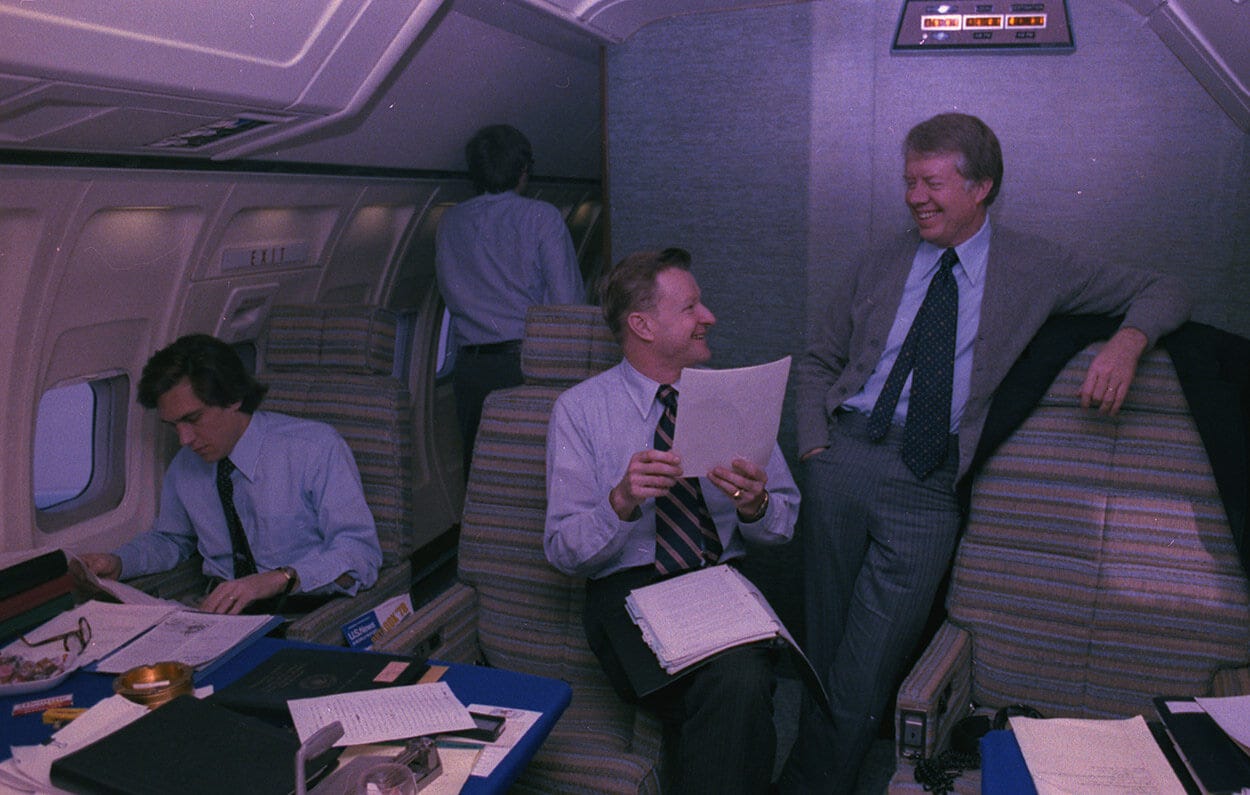
The Trilateral Commission, for those who don’t know, is an international organization that was—to quote Sutton & Wood—“founded by the persistent maneuvering of David Rockefeller and Zbigniew Brzezinski” in 1973. They continue on p. 1:
Rockefeller was chairman of the ultra-powerful Chase Manhattan Bank, a director of many major multinational corporations and “endowment funds” and had long been a central figure in the Council on Foreign Relations (CFR). Brzezinski, a brilliant prognosticator of one-world idealism, was a professor at Columbia University and the author of several books that have served as “policy guidelines” for the Trilateral Commission. Brzezinski served as the Commission’s first executive director from its inception in 1973 until late 1976…
Brzezinski himself later confirmed in an interview with C-SPAN’s Brian Lamb that he ran the Commission for “about three years,” adding: “Not only did I run it; I helped to found it and organize it with David Rockefeller. . . . it was a brand new idea, which the two of us had thought of—Rockefeller and I.”
When founding the Trilateral Commission with Brzezinski in 1973, Rockefeller was—as alluded to above—already Chair of the highly influential Council on Foreign Relations (CFR), a position he had held since 1970. He was the CFR’s Vice President for twenty years prior to that, beginning in 1950.
“If the Council on Foreign Relations can be said to be a spawning ground of one-world idealism, then the Trilateral Commission is the ‘task force’ assembled to assault the beachheads,” Sutton & Wood said (p. 2).
Regarding the Trilateral Commission’s composition and membership, they wrote a short while later:
The initial Commission membership was approximately three hundred, with roughly one hundred each from Europe, Japan and North America. Membership was also roughly divided between academics, politicians and corporate magnates; these included international bankers, leaders of prominent labor unions and corporate directors of media giants.
The word commission was puzzling since it is usually associated with instrumentalities set up by governments. It seemed out of place with a so-called private group unless we could determine that it really was an arm of a government – an unseen government, different from the visible government in Washington. European and Japanese involvement indicated a world government rather than a national government. We hoped that the concept of a sub-rosa world government was just wishful thinking on the part of the Trilateral Commissioners. The facts, however, lined up quite pessimistically.
Again, Carter—often sold to the American public (then and now) as merely an “outsider” from a peanut farm—was invited to be one of the first North American members of the Trilateral Commission three years earlier, in 1973—the same year it was founded.
Don’t take it from us though. Here is Carter himself in a letter published in Trialogue, the Trilateral Commission’s own publication, talking about his “active service on the Commission since its inception in 1973.” Specifically, this is from p. 12 of the edition published in January of 1977, the same month Carter was inaugurated:
A May 23, 1976 article written by Leslie H. Gelb for the New York Times (cited by Sutton & Wood on p. 4), explains:
“[Brzezinski] was the first guy in the Community to pay attention to Carter, to take him seriously,” said someone who has had a chance to watch the courtship. “He spent time with Carter, talked to him, sent him his books and articles, educated him.” For the better part of three years, Brzezinski (along with Prof. Richard N. Gardner of Columbia) had Carter virtually to himself, while the Community as a whole was looking elsewhere, to Senators Kennedy and Mondale. It paid off. Brzezinski, with Gardner and Henry Owen of the Brookings Institution, is now described by Carter aides as the leading man on Carter’s foreign policy task force.
Here’s what happened less than a year later (Sutton & Wood, pp. 4-5):
Upon Carter’s election, Brzezinski was appointed assistant to the president for national security matters. Commonly, he [was] called the head of the National Security Council because he [answered] only to the president — some say Brzezinski [held] the second most powerful position in the U.S.
Carter’s running mate, Walter Mondale, was also a member of the Commission. (If you are trying to calculate the odds of three virtually unknown men, out of over sixty Commissioners from the U.S., capturing the three most powerful positions in the land, don’t bother. Your calculations will be meaningless.)
On January 7, 1977 Time Magazine, whose editor-in-chief, Hedley Donovan, was a powerful Trilateral, named President Carter “Man of the Year.” The sixteen-page article in that issue not only failed to mention Carter’s connection with the Commission but also stated the following:
“As he searched for Cabinet appointees, Carter seemed at times hesitant and frustrated disconcertingly out of character. His lack of ties to Washington and the Party Establishment – qualities that helped raise him to the White House – carry potential dangers. He does not know the Federal Government or the pressures it creates. He does not really know the politicians whom he will need to help him run the country.”
Is this portrait of Carter as a political innocent simply inaccurate or is it deliberately misleading? By December 25, 1976 – two weeks before the Time article appeared – Carter had already chosen his cabinet. Three of his cabinet members – Cyrus Vance, Michael Blumenthal, and Harold Brown – were Trilateral Commissioners; and the other non-Commission members were not unsympathetic to Commission objectives and operations.
In addition to those cabinet-level selections—Secretaries of State, Treasury and Defense, respectively—Carter appointed fourteen more Trilateral Commissioners to top government posts. A list is provided by Sutton & Wood on p. 23-24:
Andrew Young – ambassador to the United Nations
Warren Christopher – deputy secretary of state
Lucy Wilson Benson – under secretary of state for security affairs
Richard Cooper – under secretary of state for security affairs
Richard Holbrooke – under secretary of state for economic affairs
W. Anthony Lake – under secretary of state for policy planning
Sol Linowitz – co-negotiator on the Panama Canal Treaty
Gerald Smith – ambassador-at-large for nuclear power negotiations
Elliott Richardson – delegate to the Law of the Sea Conference
Richard Gardner – ambassador to Italy
Anthony Solomon – under secretary of the treasury for monetiary affairs
C. Fred Bergsten – assasitant secretary of the treasury for international affairs
Paul Warnke – director, arms Control and Disarmament Aency
Robert R. Bowie – deputy directory of intelligence for national estimates
“As of 25 December 1976, therefore, there were nineteen Trilaterals, including Carter and Mondale, holding tremendous political power,” they write (p. 3). “These presidential appointees represented almost one-third of the Trilateral Commission members from the United States. Try to give odds to that!”
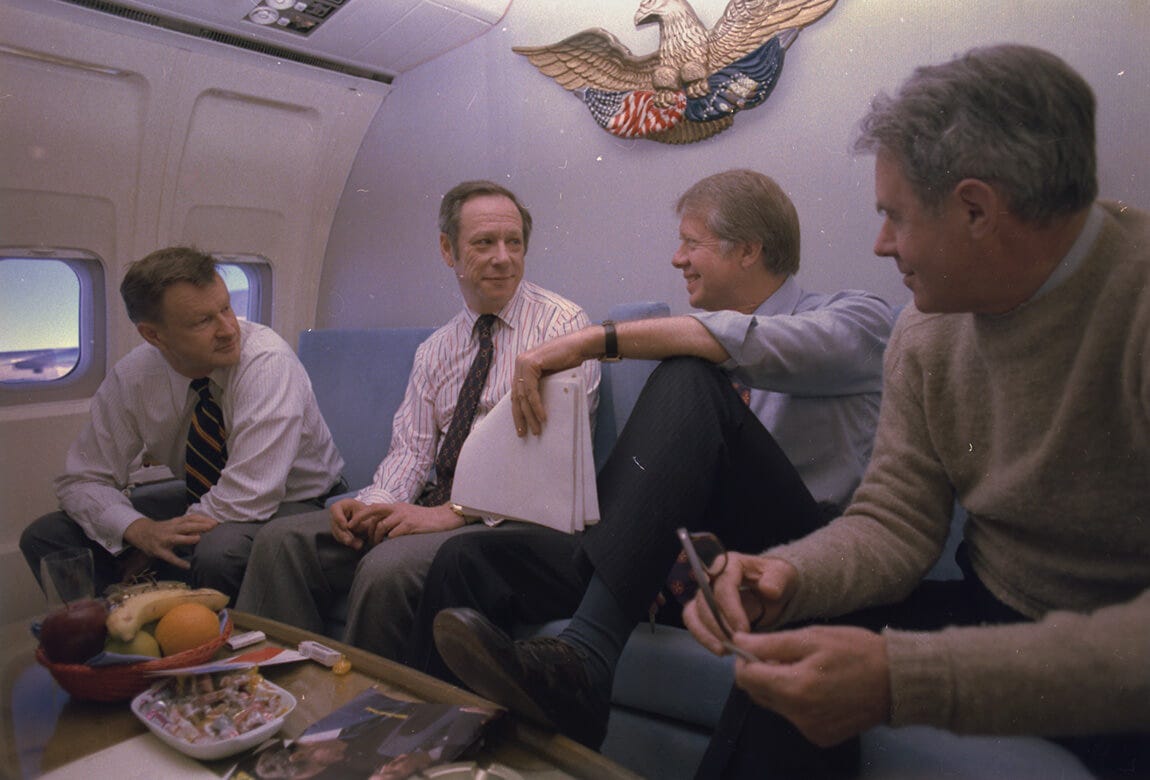
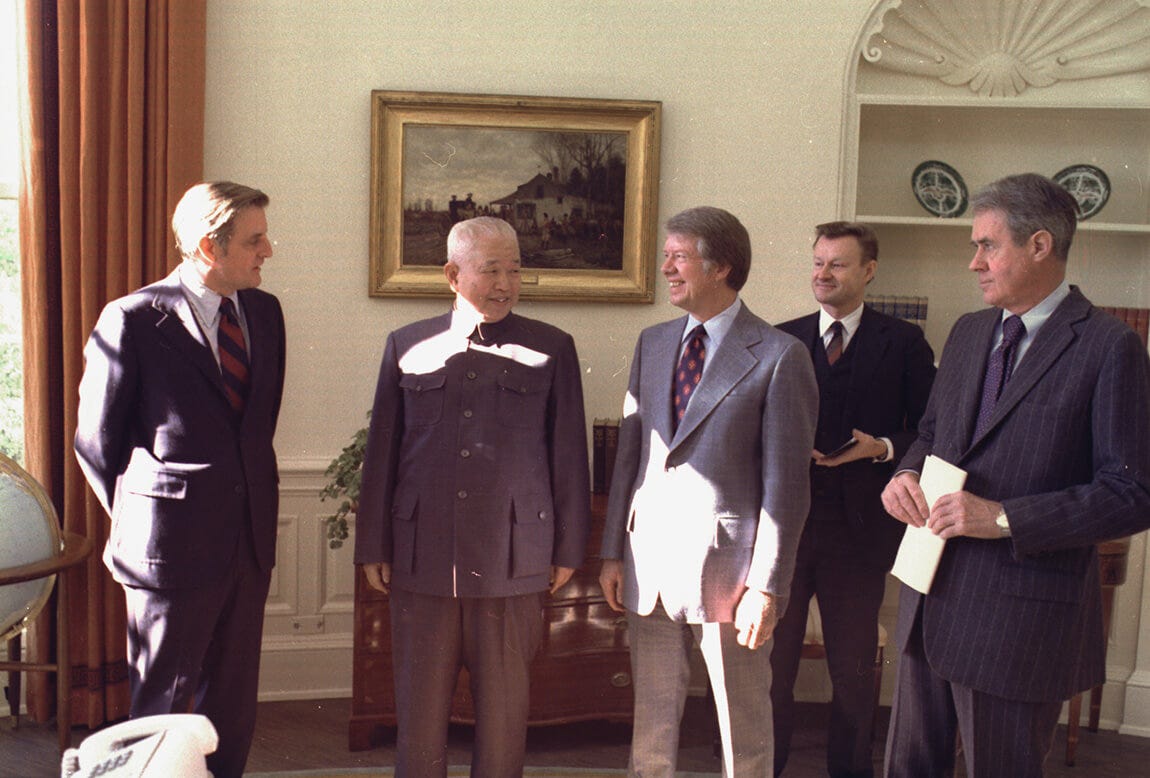
‘A Secret Cabal’
A deep dive into the ideology of Rockefeller, Brzezinski, and the Trilateral Commission — and how Carter was brought into alignment with it in the years leading up to his presidential run — is beyond the scope of this article, but Sutton & Wood note, for example, how Carter’s letter to the Trilateral Commission (cited earlier) mirrors the language of Brzezinski’s, which was published on the same page of the same January 1977 edition of Trialogue:

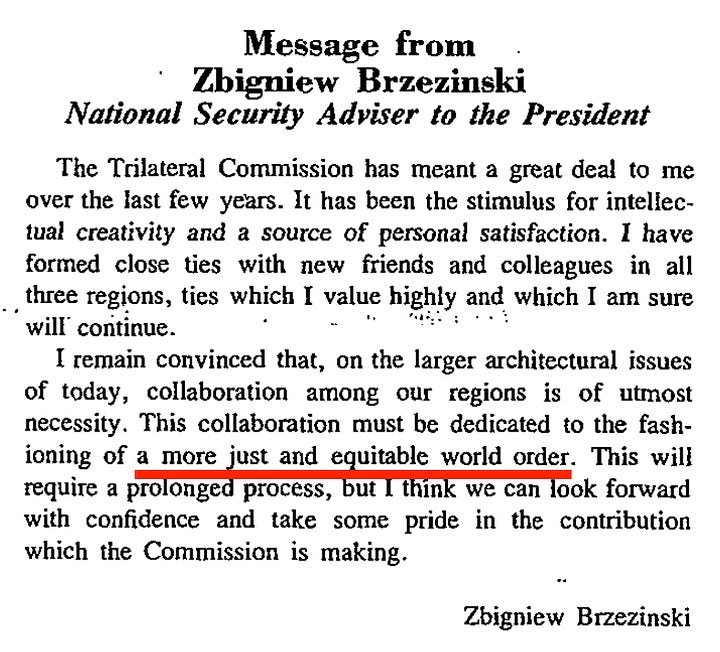
In their book, Sutton & Wood provide an overview of what that means, based on quotes from Brzezinski himself. From pp. 6-8 (click to enlarge):
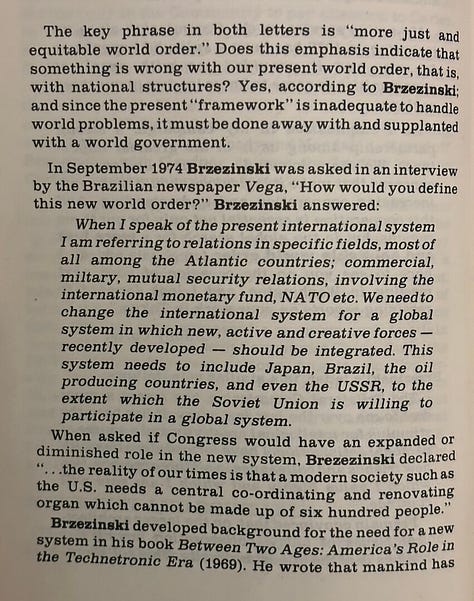
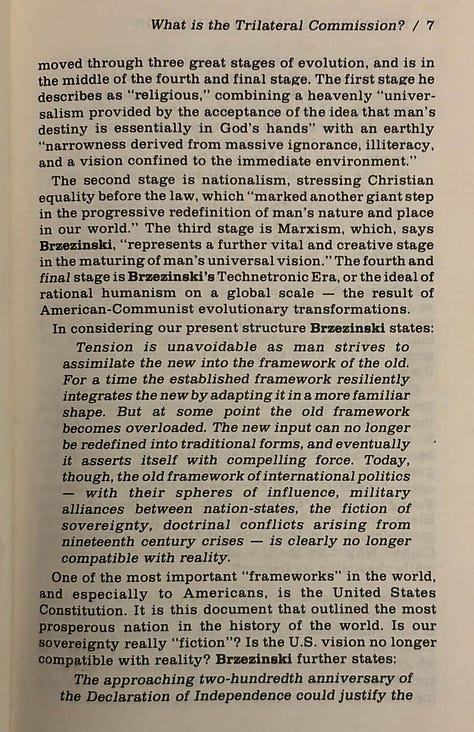
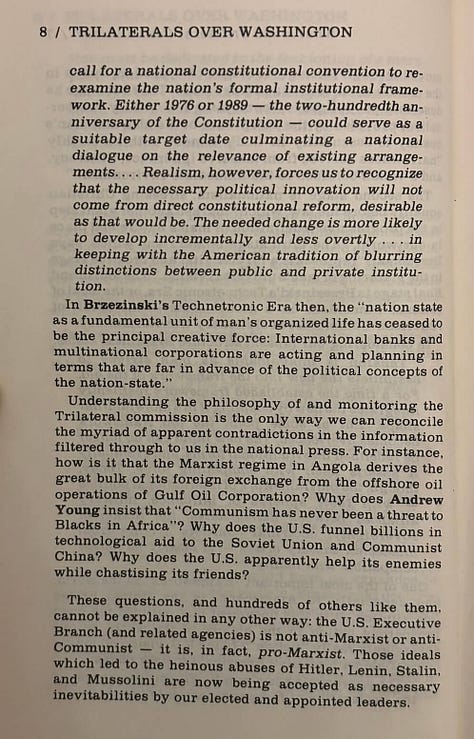
David Rockefeller, for his part, stated on p. 405 of his 2002 Memoirs (bold added):
For more than a century, ideological extremists, at either end of the political spectrum, have seized upon well-publicized incidents… to attack the Rockefeller family for the inordinate influence they claim we wield over American political and economic institutions. Some even believe we are part of a secret cabal, working against the best interests of the United States, characterizing my family and me as ‘internationalists,’ and of conspiring with others around the world to build a more integrated global political and economic structure – one world, if you will. If that’s the charge, I stand guilty, and I am proud of it.
“It would have been damaging enough if the Trilateral domination of the Carter administration was merely a one-time anomaly,” Wood wrote in 2007, “but it was not. Subsequent presidential elections brought George H.W. Bush (under Reagan), William Jefferson Clinton, Albert Gore and Richard Cheney (under G. W. Bush) to power” — all Trilateral Commission members.
“Thus, every Administration since Carter has had top-level Trilateral Commission representation through the President or [Vice President], or both,” said Wood in the same 2007 article.
“It is important to note that Trilateral domination has transcended political parties,” he added. “They dominated both the Republican and Democrat parties with equal aplomb.”
Starting with the administration of one their earliest recruits: Jimmy Carter.
Works cited and further reading:
“Trilaterals Over Washington” by Antony C. Sutton and
“The Trilateral Commission: Usurping Sovereignty” by
“The Unauthorized Biography of David Rockefeller” by The Corbett Report
“Meet Zbigniew Brzezinski, Conspiracy Theorist” by The Corbett Report
“When Jimmy Carter Lied to Me (Twice) and the Weaponization of Most Everything” by
Patrick Wood, who is heavily cited in this piece, writes at technocracy.news & Substack, and posts on X.
This article was originally published at decensored.news. For more reporting like this, please follow Decensored News on multiple platforms, bookmark the website, and subscribe here on Substack:


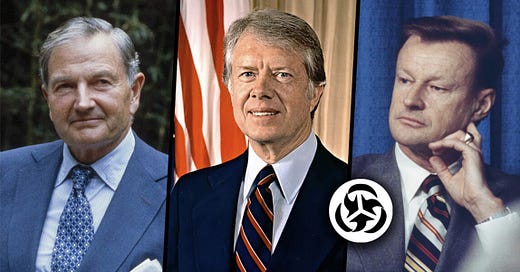



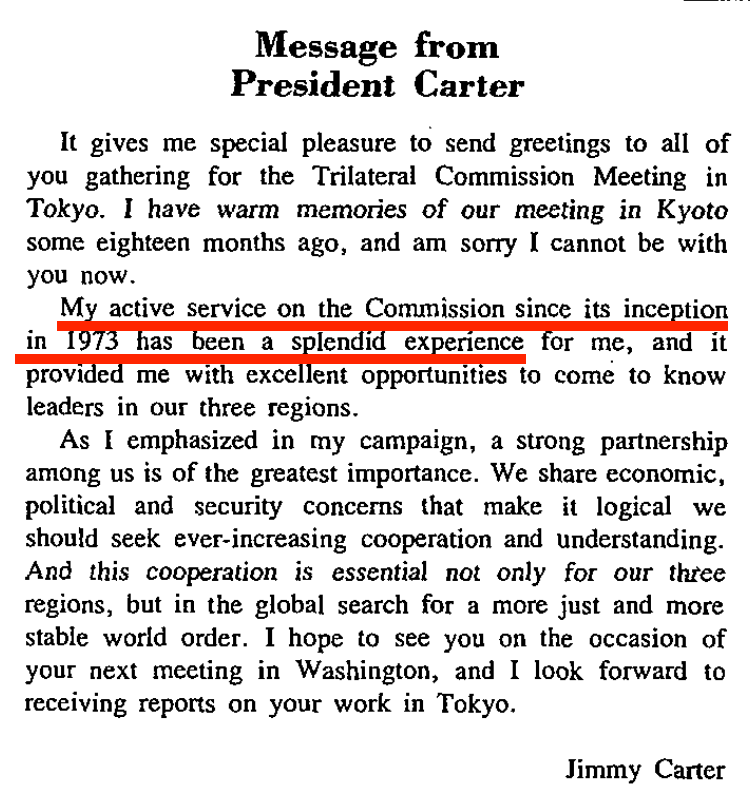
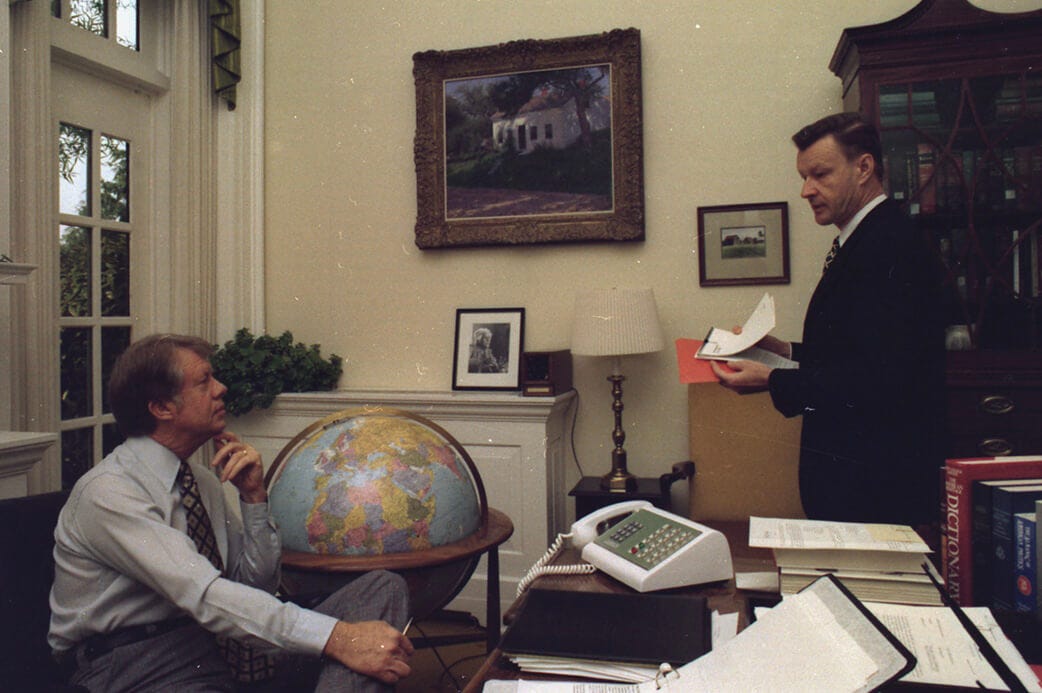
Excellent history lesson Ann's eye opener! Rockefeller served under both parties so you know who's calling the shots.
“Former National Security Advisor Zbigniew Brzezinski publishes a book [in 1997] in which he portrays the Eurasian landmass as the key to world power, and Central Asia with its vast oil reserves as the key to domination of Eurasia…’The attitude of the American public toward the external projection of American power has been much more ambivalent. The public supported America’s engagement in World War II largely because of the shock effect of the Japanese attack on Pearl Harbor.’, he says. Because of popular resistance to US military expansionism, his Central Asian strategy can not be implemented ‘except in the circumstance of a truly massive and widely perceived direct external threat.’ - From The Terror Timeline by Paul Thompson p.333